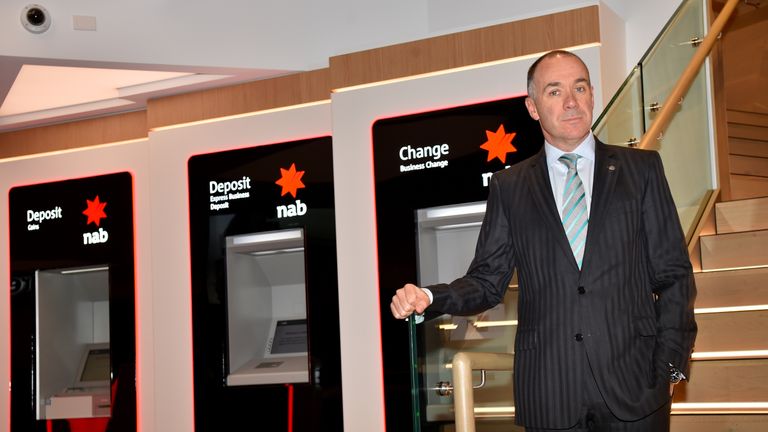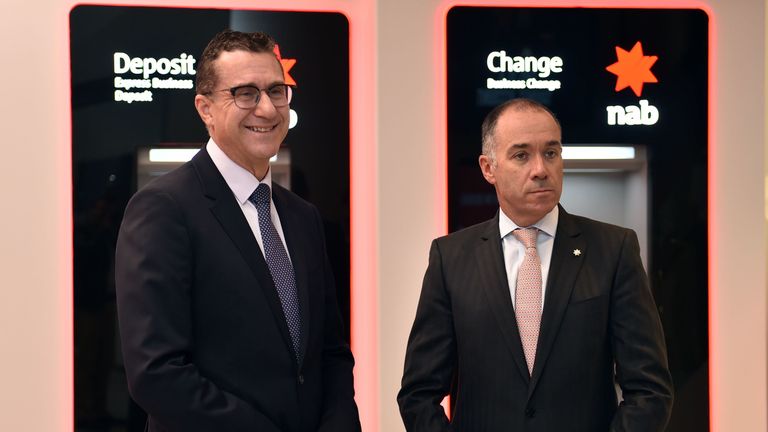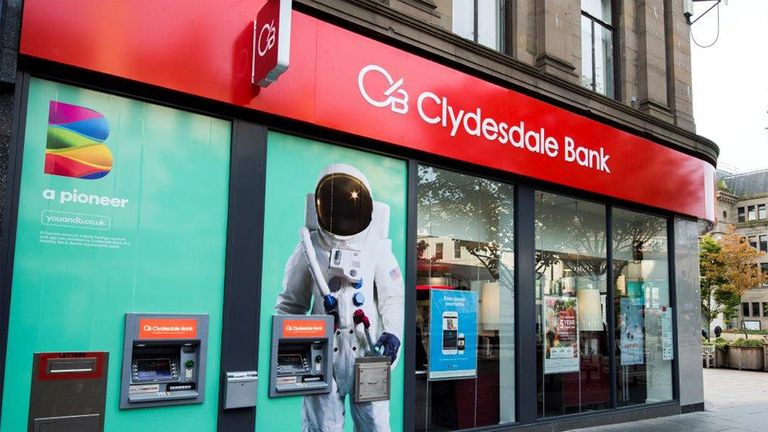NAB bosses resign as Australia bashes its banks
Sky's Ian King says the investigation into the behaviour of financial services firms has claimed the biggest scalps to date.
Thursday 7 February 2019 18:30, UK
Australia's banking system cruised through the financial crisis with barely a scrape.
None of its banks required rescuing by taxpayers, as in other parts of the world, while - thanks to the fact that they did not have to rebuild their balance sheets after the crisis - the country's lenders continued to generate some of the highest returns on equity in the global banking sector.
The country's big four - National Australia Bank (NAB), Australia and New Zealand Banking Group (ANZ), Commonwealth Bank of Australia (CBA) and Westpac - became four of the Lucky Country's five most valuable companies.
Now, though, Australians are looking very differently at how their banks behaved before, during and after the financial crisis.
A year-long Royal Commission into misconduct in the banking, superannuation [pensions] and financial services industry has shredded the reputation of banks, bankers and other financial institutions.
The scandal has already cost Craig Meller and Catherine Brenner, respectively chief executive and chairwoman of the pensions and insurance giant Australian Mutual Provident (AMP), their jobs.
And today it claimed its first big scalps from the banking sector as Andrew Thorburn and Ken Henry, respectively chief executive and chairman of NAB, resigned.
Both had been insisting only 24 hours earlier that they would not be stepping down because they wanted to oversee improvements in the culture and governance of the lender which, until 2016, owned Clydesdale Bank and Yorkshire Bank in the UK.
They may not be the last to go.
The commission has revealed that Australia's banks have behaved just as appallingly as their US and European counterparts.
In no particular order, it has revealed that, in the past, the banks and other financial institutions variously charged the accounts of dead customers, lied to regulators, rigged benchmark interest rates, mis-sold insurance policies, mishandled the money of customers, denied dying customers insurance payouts to which they were entitled and broke anti-money laundering rules aimed at cutting off finance to terrorists and the drugs trade.
What has made the commission more dramatic than similar hearings elsewhere, such as the parliamentary commission on banking standards in Britain, is that the investigation was widened from the banks to take in insurers and pension providers and that customers who had received poor service from the industry were invited to give evidence.
The commission's conclusions, published on Monday, will come as no surprise to anyone who examined the causes of the financial crisis elsewhere.
It argues that this behaviour was triggered by "greed - the pursuit of short-term profit at the expense of basic standards of honesty".
It goes on: "Banks, and all financial services entities recognised that they sold services and products. Selling became their focus of attention. Too often it became the sole focus of attention. Products and services multiplied. Banks searched for their 'share of the customer's wallet'.
"From the executive suite to the front line, staff were measured and rewarded by reference to profit and sales. When misconduct was revealed, it either went unpunished or the consequences did not meet the seriousness of what had been done."
The outcome of the commission looks likely to echo what has happened elsewhere around the world. Huge schemes to compensate customers for the fees they were wrongly charged are now under way.
An estimated £4bn has already been paid out - to put that in context, Britain's banks have so far shelled out more than £30bn to customers for the mis-selling of Payment Protection Insurance - and financial regulation is being stepped up.
Kenneth Hayne, the royal commissioner, has also recommended that criminal charges be pursued against two unnamed financial institutions and asked that regulators investigate 24 specific cases against CBA, NAB, ANZ and AMP.
However, if you are seeking the first judgment on the commission, look at the stock market reaction.
Nearly £11bn was added to the stock market value of the big four - three of whom enjoyed the biggest one-day gain in their shares during the last decade - as investors concluded the outcome could have been worse.
AMP enjoyed its biggest one-day share price gain of all time.
That partly highlights the fact that share prices had been smashed in the run-up to the commission's final report.
More than £27bn has been wiped from the stock market value of the big four and AMP since the commission was first announced in November 2017.
But the Aussie banks are still huge.
CBA has a stock market value of £72bn and Westpac is valued at £51bn. That makes them appreciably bigger than European lenders like BNP Paribas (£46bn), Lloyds (£41bn), UBS (£39bn), RBS (£30bn), Barclays (£28bn), Credit Suisse (£24bn) and Deutsche Bank (£14bn).
Only HSBC (£130bn) and Santander (£59bn) dwarf the Aussie lenders in market capitalisation terms. And the smaller members of the big four, ANZ (£42bn) and NAB (£38bn), are still bigger than or the same size as their big European counterparts.
This week's events are unlikely to be the end of the story, though.
Australia has federal elections coming up this year and the politicians will be vying with each other to show who can be toughest on the banks.
Scott Morrison, the PM, will hope to take credit for launching the commission. His Labor opponents will seek credit for having been the first to demand it.
So the Aussie banks may not, despite this week's share price rallies, be off the hook yet.






